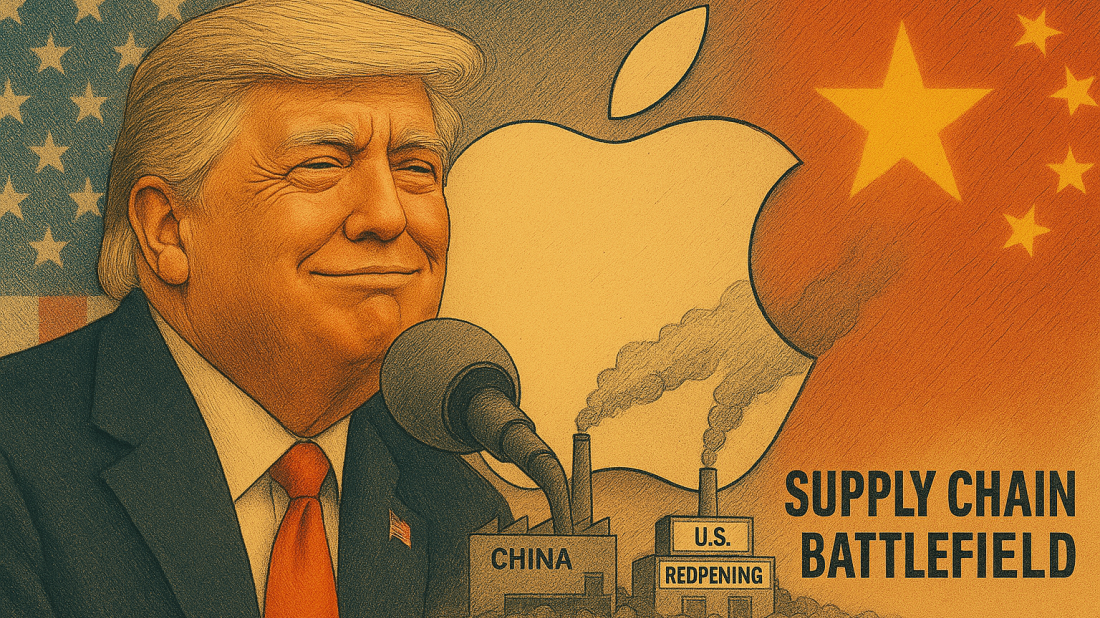Council of Europe torture watchdog raises concerns over police treatment of protesters in Georgia
Georgia is facing renewed scrutiny over alleged police ill-treatment and lack of accountability after the Council of Europe’s anti-torture body rais...

President Donald Trump is pressuring Apple to move iPhone manufacturing from China to the United States. But supply chain experts say the plan faces massive barriers built over decades.
The iPhone is assembled from around 2,700 parts, involving 187 suppliers across 28 countries.
Today, less than 5% of its components are made in America.
High-tech parts come mainly from Taiwan, South Korea, and Japan, while final assembly is centred in China.
Commerce Secretary Howard Lutnick said this month that “an army of human beings” would now build iPhones in America.
But analysts warn a U.S.-assembled iPhone could cost up to $3,500, far beyond current prices.
Apple's choice to remain anchored in Asia goes beyond cheap labour.
Experts say China offers speed, flexibility, and world-class scale unmatched by any U.S. alternative.
Final assembly is dominated by Foxconn, a Taiwanese firm with sprawling facilities in China.
Its Zhengzhou iPhone City alone cost $1.5 billion to build and employs 350,000 workers at peak.
Apple is gradually expanding production in India, aiming to diversify risk, but moving full operations to the U.S. would require rebuilding complex supplier ecosystems from scratch.
TechInsights estimates assembling an iPhone costs Apple just $10 per device today.
Ripping up supply chains would erase those efficiencies overnight.
Despite Trump's calls, Apple is seen as highly unlikely to move iPhone assembly to the U.S., according to analysts.
The entrenched networks across China and Southeast Asia are simply too vast, too specialised, and too embedded to replicate quickly.
Apple’s iPhone production remains a symbol of the global economy’s deep integration—one that tariffs and political pressure alone cannot undo.
The drumbeats have finally faded at the Marquês de Sapucaí, bringing the competitive phase of the Rio Carnival 2026 to a dazzling close. Over two marathon nights of spectacle, the twelve elite schools of the "Special Group" transformed the Sambadrome into a riot of colour.
Peru’s Congress has voted to censure and remove José Enrique Jeri Ore from his posts as President of Congress and acting President of the Republic, just four months into his tenure, citing undisclosed meetings with Chinese businessmen and alleged hiring irregularities.
Israel is preparing for the possibility of receiving a green light from the United States to launch strikes against Iran’s ballistic missile system, according to Israel’s public broadcaster KAN.
France celebrated Olympic gold in the men’s biathlon relay in Anterselva on Tuesday (17 February), following a thrilling race marked by an electric atmosphere at the stadium.
Aghdam’s Qarabag FK experienced a 6–1 defeat to England’s Newcastle United in the first leg of their UEFA Champions League play-off tie in Azerbaijan's capital Baku Wednesday evening (18 February).
ByteDance will take steps to prevent the unauthorised use of intellectual property on its artificial intelligence (AI) video generator Seedance 2.0, the Chinese technology firm said on Monday.
The formation of a black hole can be quite a violent event, with a massive dying star blowing up and some of its remnants collapsing to form an exceptionally dense object with gravity so strong not even light can escape.
BMW is recalling a mid six figure number of vehicles worldwide after identifying a potential fire risk linked to the starter motor.
British chipmaker Fractile will invest £100 million over the next three years to expand its artificial intelligence hardware operations in the UK, opening a new engineering facility in Bristol as it ramps up production of next-generation AI systems.
The European Union has launched its largest semiconductor pilot line under the European Chips Act, investing €700 million ($832 million) in the new NanoIC facility at IMEC in Leuven, Belgium, as part of efforts to strengthen Europe’s technological sovereignty.
You can download the AnewZ application from Play Store and the App Store.

What is your opinion on this topic?
Leave the first comment